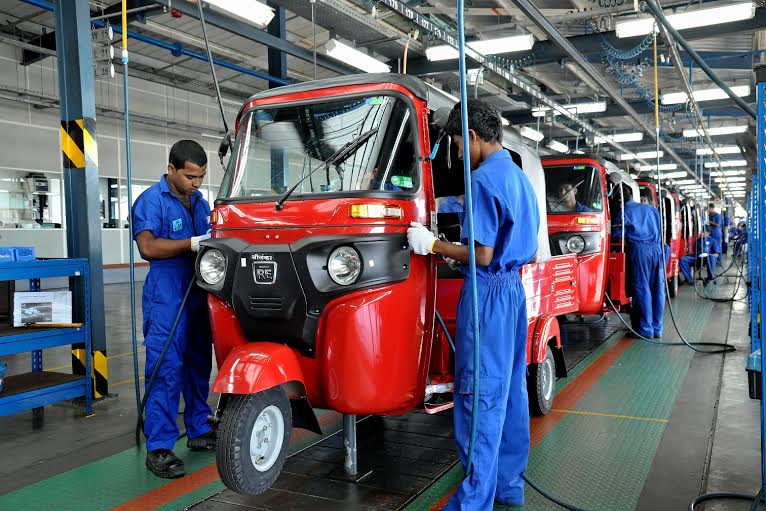October, 6, 2014

From design to installation and efficiency to sustainability, David Pieris Motor Company Limited’s (DPMC) automotive assembly plants in Ranna and Madapatha stand testimony to local ingenuity and engineering expertise.
DPMC first started conveyorised assembly of vehicles 18 years ago. The Madapatha Facilities Complex, commissioned in 1996, assembles a wide range of fuel-efficient motorcycles for the Sri Lankan market. The state-of-the-art Ranna Facilities Complex, commissioned in 2010, houses one of the largest conveyorised assembly facilities in the island.
Traditionally used to improve efficiency of manual or semi-automated assembly process, conveyors today are an essential element of mass production. At both facilities, partly assembled three-wheelers and motorcycles are mechanically moved along the conveyor belt and at each workstation mechanics skilled in a specialist task assemble a specific component of the vehicle with the use of pneumatic tools. Advanced tools, though costlier, are efficient, accurate, safer and lighter to handle, making the entire assembly process hassle free and fatigueless for mechanics.
“A conveyorised process is essential to improve production capacity to meet demand on time. Our engineers considered the sequence of assembling, volume, maintenance and administrative requirements when designing the conveyorised belt. They went one step further and gave the facility the ability to set conveyor speeds according to the output required,” Ajith Preethilal, Divisional Manager - Operations said.
With continuous improvements to working practices, personal efficiency and sustainability, DPMC has mastered the manufacture of three-wheelers and motorcycles to the highest quality and standards.
“The conveyorised assembly line gives the distinct advantage of efficiency, flexibility and the ability to do online quality checking as opposed to offline checks. This facility has been ISO 9001:2008 certified for our quality management systems and has also obtained ISO 14001:2004 certification for environmental management systems. We didn’t build this facility with the hope of obtaining ISO standards, but we realised that we had been ahead of time in environmentally friendly processes. So, the facility automatically qualified for such standards,” Kamal Meedeniya, Deputy General Manager - Assembly Operations said.
The resourcefulness of local engineers evident in the assembly process has helped DPMC raise the benchmark of Sri Lanka’s automotive industry. “The installation of the conveyorised assembly line was done entirely by local engineers and inventions such as the rotatable forklift and the aluminum scrap straightening machine were designed by our own mechanics,” Meedeniya said.
Introduced as a convenient and affordable ‘family vehicle’ by DPMC, three-wheelers have given mobility and supported livelihoods of hundreds of thousands of people.
The company’s three-wheeler localisation programme launched to promote innovation and entrepreneurship among rural communities has resulted in the local manufacturing of spare parts at a higher quality. Much of the hood covers, hood bar frames, seats, mud flaps, tyres, tyre tubes, side mirrors and other ancillary rubber and plastic items are now being sourced locally by DPMC which in turn has helped generate employment and boost regional economies. With technical expertise and market access, DPMC’s three-wheeler localisation initiative has transformed youth in the informal sector into skilled and fully fledged spare parts suppliers.
With continuous training in technical skills at the company’s Internal Training Division, external training institutions and overseas, the workforce at DPMC is the most skilled in the island for automotive assembling. “The staff receives continuous training in operational safety, the efficient use and maintenance of advanced pneumatic tools and managerial expertise like leadership and team building skills,” Damitha Ganegoda, Operations Manager at Madapatha Facilities Complex said.
Well maintained recreational facilities in both Ranna and Madapatha offer the staff an opportunity to socialise after work and play a game of cricket, basketball, badminton, volleyball, pool or table tennis, or enjoy a good workout at the fully equipped gym.
Responsible manufacturing and sustainability are key areas of focus at all DPMC facilities. Aligning with this principle and in keeping with industry standards, all fully assembled three-wheelers and motorcycles are subjected to an emission test before they are released to the market. Both facilities have rainwater harvesting installations, a zero waste policy and are involved in social responsibility programmes in the neighborhood. “Our waste matter from packaging to rubber products and paint are disposed of in a responsible and environmentally friendly manner. We go to the extent of checking how our buyers recycle them,” Lagath Jayarathna, Assistant Manager - Operations of the Ranna Manufacturing Complex said.
DPMC, a name synonymous with motorcycles and three-wheelers, has ventured far beyond the role of a traditional vehicle importer and championed local engineering and inventiveness, community development and sustainability, effectively raising the benchmark of the island’s automotive industry.
Video Story